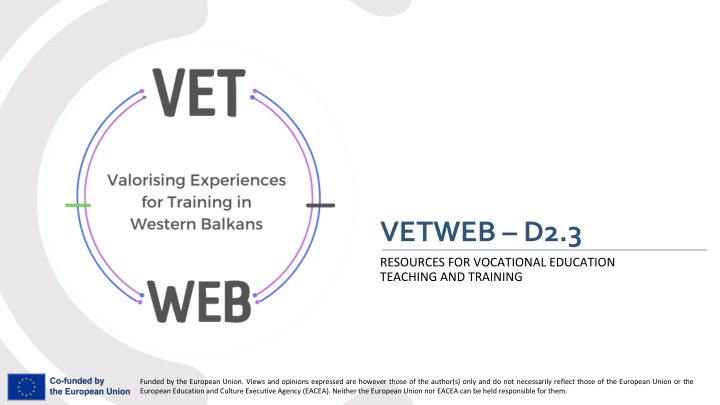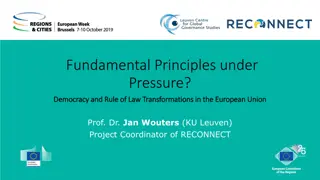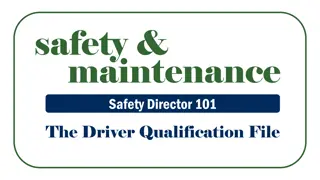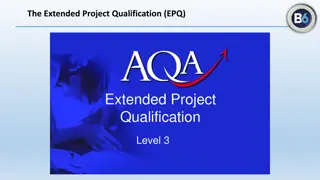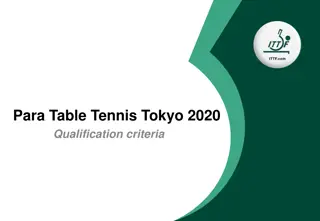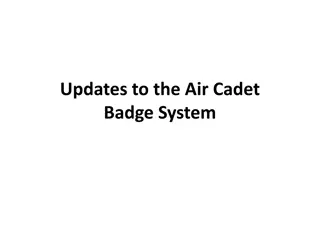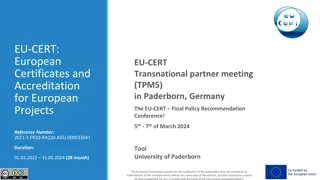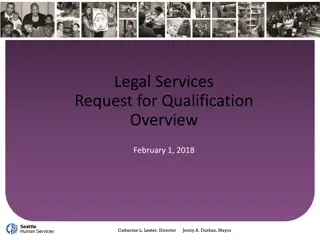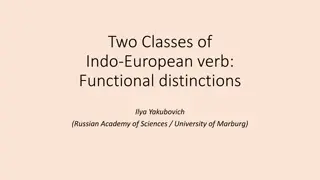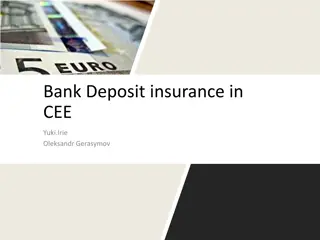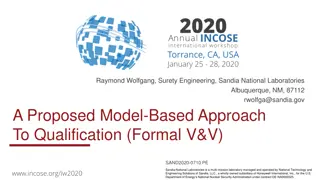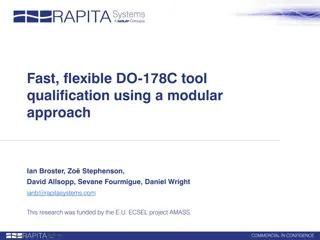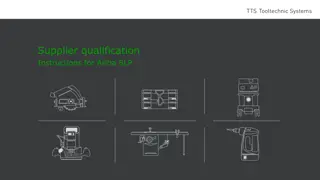European Qualification Framework (EQF) Overview
The European Qualification Framework (EQF) plays a significant role in harmonizing qualifications across Europe. It provides a comprehensive mapping of qualification levels, aiding VET providers in designing effective training programs. By aligning with the EQF, professionals can enhance the quality of training and improve learning outcomes for students.
Download Presentation

Please find below an Image/Link to download the presentation.
The content on the website is provided AS IS for your information and personal use only. It may not be sold, licensed, or shared on other websites without obtaining consent from the author.If you encounter any issues during the download, it is possible that the publisher has removed the file from their server.
You are allowed to download the files provided on this website for personal or commercial use, subject to the condition that they are used lawfully. All files are the property of their respective owners.
The content on the website is provided AS IS for your information and personal use only. It may not be sold, licensed, or shared on other websites without obtaining consent from the author.
E N D
Presentation Transcript
VETWEB D2.3 RESOURCES FOR VOCATIONAL EDUCATION TEACHING AND TRAINING Funded by the European Union. Views and opinions expressed are however those of the author(s) only and do not necessarily reflect those of the European Union or the EuropeanEducation and Culture Executive Agency (EACEA).Neither the EuropeanUnion nor EACEA can be held responsible for them.
Abstract Many resources are made available by European institutions to help and sustain the roll-out of effective and impactful Vocational Education and Training programmes across EU and involving formal, non-formal and informal learning environments. The content available in this introductory training provides for VET professionals some key essentials that they should implement within their daily practices and in accordance with the latest developments in the matter of education and training, teaching, upskilling and re-skilling of people.
Index EQF The European Qualification Framework EQAVET The Quality Assurance Framework for VET provision EURES The EU cooperation network for employment CEDEFOP EU centre for the development of VET ESCO EU Skills, Competences, Qualifications & Occupations EUROPASS Learning and working in EU MICRO-CREDENTIALS The great new development of the education and training ecosystem
Objectives & Goals By embedding the recommended resources listed in this introductory training, professionals operating within the VET ecosystem will be better informed to provide for high-quality training, deliver a better learning experience for students, and increase the general impact of the training and education session. The guidelines and principles here recommended apply independently to the specific and technical content of the training, and apply transversally to reach for a normalized level of education standards across Europe and training fields. Users can gain great benefits from their application, and they can surely replicate their roll-out and into-practice implementation regardless of the context.
EQF - The European Qualification Framework The EQF is a transnational framework applied to increase the comparability, transparency and international transferability of people s qualifications at cross- national level. The EQF is currently adopted by all EU Member States and other 11 countries and provides for a truly comprehensive mapping of all possible ranks of qualifications. Eight learning-outcomes based levels of qualifications are foreseen, with level 1 and level 8 as respectively the lowest and highest level of qualifications possible. When designing and strategizing the content of training programmes, and learning outcomes desired, VET providers are recommended to look into the EQF and compare what is the positioning of their offer.
EQF - Learning outcomes are defined in terms of Knowledge, Skills and Responsibility and Autonomy Knowledge Skills Responsibility In the context of EQF, knowledge is described as theoretical factual. In the context of EQF, skills are described as cognitive (involving the use of logical, intuitive and creative thinking) and practical manual dexterity and the use of materials, instruments). In the context of the EQF responsibility autonomy is described as the ability of the learner to apply knowledge and skills autonomously and with responsibility and and/or (involving methods, tools and
Level Knowledge Skills Responsibility Basic general knowledge Basic skills required to carry out simple tasks Work or study under direct supervision in a structured context 1 Basic factual knowledge of a field of work or study Basic cognitive and practical skills required to use relevant information in order to carry out tasks and to solve routine problems using simple rules and tools Work or study under supervision with some autonomy 2 Knowledge of facts, principles, processes and general concepts, in a field of work or study A range of cognitive and practical skills required to accomplish tasks and solve problems by selecting and applying basic methods, tools, materials and information Take responsibility for completion of tasks in work or study; adapt own behaviour to circumstances in solving problems 3 Factual and theoretical knowledge in broad contexts within a field of work or study A range of cognitive and practical skills required to generate solutions to specific problems in a field of work or study Exercise self-management within the guidelines of work or study contexts that are usually predictable, but are subject to change; supervise the routine work of others, taking some responsibility for the evaluation and improvement of work or study activities 4 Comprehensive, specialised, factual and theoretical knowledge within a field of work or study and an awareness of the boundaries of that knowledge A comprehensive range of cognitive and practical skills required to develop creative solutions to abstract problems Exercise management and supervision in contexts of work or study activities where there is unpredictable change; review and develop performance of self and others 5 Advanced knowledge of a field of work or study, involving a critical understanding of theories and principles Advanced skills, demonstrating mastery and innovation, required to solve complex and unpredictable problems in a specialised field of work or study Manage complex technical or professional activities or projects, taking responsibility for decision-making in unpredictable work or study contexts; take responsibility for managing professional development of individuals and groups 6 Highly specialised knowledge, some of which is at the forefront of knowledge in a field of work or study, as the basis for original thinking and/or research. Critical awareness of knowledge issues in a field and at the interface between different fields Specialised problem-solving skills required in research and/or innovation in order to develop new knowledge and procedures and to integrate knowledge from different fields Manage and transform work or study contexts that are complex, unpredictable and require new strategic approaches; take responsibility for contributing to professional knowledge and practice and/or for reviewing the strategic performance of teams 7 Source: European Union Knowledge at the most advanced frontier of a field of work or study and at the interface between fields The most advanced and specialised skills and techniques, including synthesis and evaluation, required to solve critical problems in research and/or innovation and to extend and redefine existing knowledge or professional practice Demonstrate substantial authority, innovation, autonomy, scholarly and professional integrity and sustained commitment to the development of new ideas or processes at the forefront of work or study contexts including research 8
EQAVET-The Quality Assurance framework for VET provision The European Quality Assurance (QA) Reference Framework for Vocational Education and Training (EQAVET) is the standard EU wide framework to support and strengthen QA mechanisms in VET provision. The EQAVET framework is inspired by the traditional DEMING cycle (planning implementation checking revising planning etc.). Uses and application of the EQAVET are many and different, the framework maintains its relevance in all typical settings in which: New VET programmes/procedures are designed; Existing VET programmes/procedures are revised and/or updated; Well-established VET programmes/procedures are monitored and evaluated with regards to their effectiveness and the impact achieved up to that moment.
EQAVET A VISUAL REPRESENTATION Setting measurable goals and objectives in terms of policies, procedures, task and human resources including other specific requirement for the smooth operation of the offer, e.g., budget up clear, appropriate and Establishing procedures to ensure the achievement of goals and objectives, e.g. development of partnerships, involvement of stakeholders, allocation of resources, and organizational procedures or operational Implemen Implemen ting ting Planning Planning Revising Revising Evaluating Evaluating Developing achieve the targeted outcomes and/or new objectives after the processing of feedback, key STKHs involved conduct discussion and analysis in order to devise procedures for change procedures in order to Designing mechanism for the evaluation of achievements and outcomes by collecting and processing data in order to make informed assessment 9 Source: European Commission
EQAVET - A two-folded application dimension SYSTEM LEVEL PRACTICE LEVEL The application at System level of the EQAVET framework supports member states and regional authorities in better understanding the effective quality and impact of their VET systems. The application at Practice level of the EQUAVET framework supports education and training professionals in better adapting their offer to high-demand skills from the labour market. Specific indicators exist per each framework s cycle to support the long- term improvement ecosystem as a whole. Specific indicators exist per each framework s cycle to increase the flexibility and responsiveness of VET professionals of the VET
EURES The EU cooperation network for employment Facilitating the free movement of workers EURES supports workers and job-seekers across Europe to find their ideal job, and employers to find their ideal candidates. VET providers can take advantage of the EURES portal to ease the matching of demand and offer, and ease the transition into the job market of their target groups. EURES services focus on the following: Matching of job vacancies and CVs on the EURES portal Information and guidance and other support services for workers and employers Access to information on living and working conditions in the EU member states, such as taxation, pensions, health insurance and social security Specific support services for frontier workers and employers in cross-border regions Support to specific groups in the context of the EURES Targeted Mobility Schemes Support to dynamic recruitment events through the European (Online) Job Days platform Information on and access to post-recruitment assistance, such as language training and support with integration in the destination country Source: EURES
CEDEFOP EU centre for the development of VET The go-to database for Vocational Education and Training CEDEFOP is the EU agency for the development of education and training. The agency s official website provides for many strategic resources for VET providers across Europe. These kind of resources goes from publication and reports, to operative online tools available for the use of professionals from the most diverse themes. Above all, in cooperation with the European Commission, CEDEFOPS proactively operates to give concrete application to EU Parliament & Council s 2009 ECVET recommendation a common EU instrument to help individuals in transfer and accumulate their learning outcomes across EU.
CEDEFOP EU centre for the development of VET Online tools CEDEFOP European Database on apprenticeship schemes Financing Adult Learning Database National Qualification Frameworks online tools Skills-OVATE European database on validation of non-formal and informal learning Financing Apprenticeship Database Terminology of European education and training policy Opinion Survey on VET European Skills and Job survey Key Indicators on VET Resource for guidance VET in Europe database VET toolkit for empowering NEETs European Skills Index Matching Skills Skills forecast VET toolkit for tackling early leaving European VET policy Dashboard Mobility Scoreboard Database Skills Intelligence Source: CEDEFOP
EU Skills, Competences, Qualifications & Occupations The ESCO framework ESCO is the official EU framework for the classification of Skills, Competences and Occupations. ESCO is used as the official glossary to describe in details all possible professionals occupations and the skills and competences associated to them and that should be detained by workers. The aims of this standardization is to ease the mobility of workers and job seekers across the EU while supporting a much better and more integrated international labour market. From the VET providers point of view, the use of ESCO is strategically relevant as it contributes to better frame the kind of learning outcomes that are needed by workers to access job opportunities.
EU Skills, Competences, Qualifications & Occupations Why is ESCO needed and what is its use ESCO understand precisely: classifications can help people to ESCO opportunities: contributes to generate several what knowledge and skills are usually required when working occupation; what knowledge, skills and competences are obtained as a result of a specific qualification; what qualifications are demanded or often requested by employers from those searching for work in a specific occupation. connects people and jobs, by providing for those key words that helps CVs in standing out; connects employment to education, by helping educators in gaining insights on the most in-demand skills and competences; connects the cross-national labour market & increases the mobility opportunities of job- seekers and workers. in a specific Source: ESCO
EUROPASS leanirng and working in EU The EUROPASS use for VET providers EUROPASS is another resource made available by the EU to ease the transition and movement of workers and job seekers in the labour market. EUROPASS makes available a large cluster of services and resources that people can look into to prepare for their next big step in life. Therefore, VET providers need to be very proficient and familiar with the kind of scale and scope of such resources to transfer their knowledge at best to their target groups. Source: Europass
Micro-credentials The great new development of the education and training ecosystem In the past few years, the EU has been particularly attentive to a renewed approach to education and training supported by the implementation and operationalisation of micro- credentials. Unlike traditional training programmes (e.g., diplomas and degrees, etc) micro-credentials- based training and education initiatives work on a very specific filed of learning and the learning outcomes associated to it can be achieved over a sensibly shortened period of time. Micro-credentials are becoming increasingly more popular in EU and at international level due to the higher degrees of flexibility they seem to guarantee and the befits of their practical use in very narrowed-focus education fields do not require extensive training programmes.
Micro-credentials Still a new-born concept The concept of micro-credential is still in a very early stage of development and no consensus on the very definition of micro-credential still exists. The best reference available as of 2023 comes from UNESCO, as per which a micro- credential: is a record of focused learning achievement verifying what the learner knows, understands or can do; includes assessment based on clearly defined standards and is awarded by a trusted provider; has standalone value and may also contribute to or complement other micro- credentials or macro-credentials, including through recognition of prior learning; meets the standards required by relevant quality assurance.
To sum up EQF - The EQF is a transnational framework used to increase the comparability, transparency and international transferability of people s qualifications at cross-national level. EQAVET - The European Quality Assurance (QA) Reference Framework for Vocational Education and Training (EQAVET) is the standard EU wide framework to support and strengthen QA mechanisms in VET provision. EURES - EURES helps workers and job-seekers across Europe to find their ideal job, and employers to find their ideal candidates. VET providers can leverage on the EURES portal to ease the matching of labour s demand and offer. CEDEFOP - CEDEFOP is the EU agency for the development of education and training. The agency s official website provides for several strategic resources for VET providers across Europe. ESCO - ESCO is the official EU framework for the classification of Skills, Competences and Occupations. The objectives of this standardization is to ease the mobility of workers and job seekers across the EU EUROPASS - EUROPASS makes available a large cluster of services and resources that people can look into to prepare for their next big step in life. MICRO-CREDENTIALS - Micro-credentials-based training and education initiatives works on a very specific filed of learning and the learning outcomes associated to it can be achieved over a sensibly shortened period of time.
THANK YOU MARIANNA.MUIN@IAL.FVG.IT HTTP://WWW.IALWEB.IT/ Funded by the European Union. Views and opinions expressed are however those of the author(s) only and do not necessarily reflect those of the European Union or the EuropeanEducation and Culture Executive Agency (EACEA).Neither the EuropeanUnion nor EACEA can be held responsible for them.
